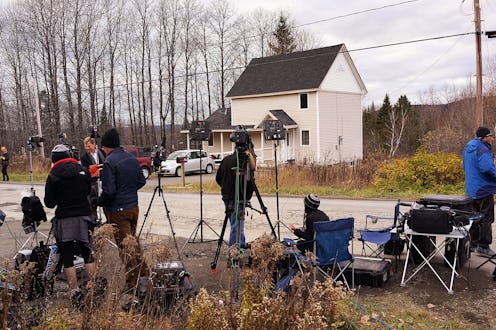News
Ebola Nurse Must Keep 3 Feet Away from Everyone
UPDATE: A Maine judge has rejected the request by state health officials to restrict Kaci Hickox's movement, who earlier flouted a quarantine for medical workers who have treated Ebola patients.
On Friday, Judge Charles LaVerdiere ruled for Hickox to continue daily monitoring and coordinate travel with state officials, but that she is not infectious, because she wasn't showing any symptoms.
The ruling follows the temporary order by the judge from Thursday, after the state filed a petition to force the nurse to stay at home.
EARLIER: The state of Maine has seemingly had enough with Kaci Hickox, as the chief judge in Fort Kent District Court Charles LaVerdiere issued a 24-hour order for Hickox to follow restrictions, similar to that of the U.S. CDC guidelines for patients with "some risk of Ebola." The temporary order requires Hickox to submit to monitoring, coordinate her travel with public health officials, not be present in public places, not leave Fort Kent, and to stay at least three feet away from others while "engaging in outdoor public activities such as jogging or biking," said ABC News.
According to the Portland Press Herald, the order stated that Hickox's lawyers said on Thursday she would abide by the restrictions and stay at home until at least Friday morning.
Hickox alarmed everyone with her bike ride on Thursday as an act of defiance against Maine's 21-day mandated quarantine. She has repeatedly said that she would fight the quarantine, calling it a violation of her civil rights.
The Press Herald reported that this might be a first — a state going to court to force someone exposed to Ebola to abide by certain restrictions, despite he or she not displaying any symptoms. Although other states have announced similar restrictions, there have been no reports of involving the court — maybe because Hickox, who is a citizen of the Pine Tree State, has been so outwardly defiant and outspoken about her thoughts on being quarantined.
Members of the media were camped outside Hickox's house on Friday morning, said the Press Herald, and were a little nervous when Fort Kent Police Chief Thomas Pelletier went in her house for the second time.
"No, I’m not bringing them out. They’re not being arrested," he said, and later while exiting the house said simply that they "just had a good morning conversation."
Although Hickox and her boyfriend Ted Wilbur have mostly stayed indoors since her return to Maine from New Jersey (where she stirred controversy after claiming that she was held under prison-like conditions), she has remained outspoken about her views on the mandated quarantine, saying the decision was "not science-based."
On Wednesday, Hickox stepped outside her house and told reporters that she was asymptomatic and therefore not at risk of transmitting the virus. She even casually shook an eager reporter's hand.
Hickox's quarantine would end on Nov. 10. The petition necessitates a hearing in the next three to 10 days, by which time Hickox's isolation period might already be over.
The rebel nurse, who returned last week from her trip with Doctors Without Borders in Sierra Leone where she treated Ebola patients, has highlighted the struggle between the fear of and response to the virus outbreak, and the hardships it poses to those on the receiving end of containment efforts.
Although there is validity in Hickox's desire to exercise her civil liberties of going outside and about her regular pre-Ebola epidemic routine, I'd like to point out that part of the reasoning behind a quarantine is to make the public feel as though they're not in harm's way, so as to avoid mass panic — remember SARS?
Ebola is difficult to contract, but it is a gruesome and cruel virus nonetheless. As a member of society herself, Hickox would be wise to at least remind herself that by abiding by her 21-day quarantine, she would be doing the public a huge favor in easing their fears — a public that, according to a CBS poll, a whooping 80 percent of thinks citizens and residents of the U.S. traveling from West Africa should be quarantined upon arrival.
